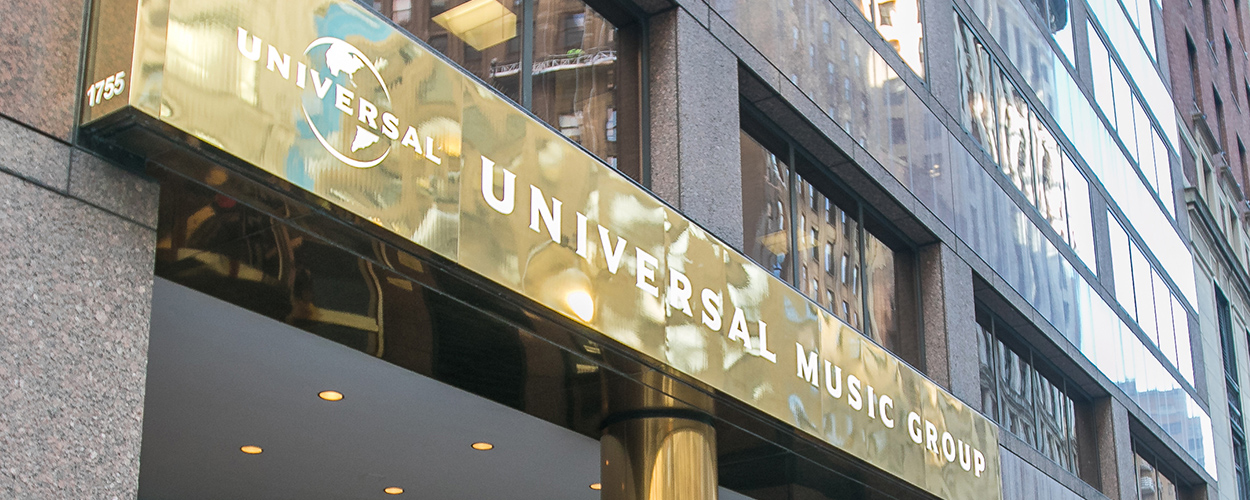This website uses cookies so that we can provide you with the best user experience possible. Cookie information is stored in your browser and performs functions such as recognising you when you return to our website and helping our team to understand which sections of the website you find most interesting and useful.
Business News CMU Digest
CMU Digest 03.04.22: Universal Music, The Leadmill, Spotify, Copyright Royalty Board, Fortnite
By Chris Cooke | Published on Sunday 3 April 2022

The key stories from the last week in the music business…
Universal Music confirmed it would start paying through royalties to unrecouped heritage artists. It made the commitment in the Environment Social Governance section of its new annual report. Under conventional record deals, artists have to initially pay back out of their royalties any cash advance they received from a label – and possibly some of the other upfront costs covered by the label too. However, a label often goes into profit on any one artist it has invested in long before that artist ‘recoups’ – ie has paid back whatever money is owed. With the rising value of catalogue in the streaming age, labels have been under pressure to write off unrecouped balances after a set period so that artists receive royalties in their bank account. Indies like Beggars led the charge in this domain, with Sony Music then committing last year to pay through royalties to unrecouped artists with pre-2000 record deals. Warner Music made a similar commitment in February ahead of Universal’s announcement this week. [READ MORE]
The future of Sheffield venue The Leadmill was in the spotlight after its management announced that they were being evicted. However, the owner of the building that houses The Leadmill – the Electric Group – which also owns and runs other venues elsewhere in the UK, insisted that the property would continue to operate as a grassroots music venue, but with new management in place. Responding, the current management team said that Electric simply intended “to profit from the goodwill and reputation” that has been built up over the 40 years that the venue has been operating, dubbing their landlord’s plan to install a new team to run the space as “a cheap, shabby, sly and underhand way of doing business”. A plethora of artists and music industry people have spoken out in support of the current management team urging the Electric Group to reconsider. [READ MORE]
Spotify failed to block a Daniel Ek deposition in its ongoing legal battle with Eminem publisher Eight Mile Style. The publisher is suing over unpaid mechanical royalties in the US, similar to various lawsuits filed before the 2018 Music Modernization Act, which changed the way mechanical royalties are paid. That act was also meant to stop lawsuits of this kind, but Eight Mile Style sued anyway. The publisher wants Ek to answer questions under oath. Spotify argued that he’s super busy and that there are other people at the streaming firm better qualified to answer the kinds of questions Eight Mile Style wants to ask. But the publisher countered that Ek has previously bragged about being hands-on involved in the launch of Spotify in the US, which would have included setting up of the previous ineffective system for paying mechanical royalties. The judge overseeing the case concluded that, given licensing music rights is at the heart of the Spotify business, Ek should take part in a three hour remote deposition. [READ MORE]
The US Copyright Royalty Board concluded that a proposed settlement between the major labels and publishers was not a “reasonable basis” on which to set the mechanical royalty rate for discs and downloads between 2023 and 2027. In the US, the mechanical copying of songs is subject to a compulsory licence, with the rates set by the CRB. With streaming it’s the services that pay the mechanical royalties, whereas with discs and downloads it’s the labels. The National Music Publishers Association and the major labels proposed keeping the current rate for discs and downloads, even though that’s 9.1 cents per copy rather than a percentage of wholesale price, meaning the value of the royalty has declined since it was introduced in 2006 because of inflation. Various songwriter groups criticised that proposal, some arguing that the NMPA is biased because its biggest members are the major publishers which are also the major labels. After much consideration, the CRB declined to adopt the NMPA’s settlement, meaning an alternative settlement or full CRB royalty rate hearing will now be required. [READ MORE]
The choreographer behind the dance routine in the video for the Charlie Puth song ‘How Long’ sued Fortnite maker Epic Games. Kyle Hanagami claims that a specific Fortnite emote – a premium feature that gamers can pay for that allows their avatar to perform a certain move – rips off the routine he developed for the Puth music video. There were a flurry of lawsuits a few years ago accusing Fortnite of infringing the copyrights of various creators with its emotes, although many of those faltered because of the complexities around the copyright in choreography and the rules regarding copyright registration in the US. However, lawyers working for Hanagami reckon he has a better case because he has registered the copyright in his ‘How Long’ routine, which was also formalised and widely viewed in the music video. With virtual worlds and metaverses on the rise – and digital assets like emotes likely to become an increasingly key revenue stream for the music and wider entertainment industries – it will be interesting to see how this case progresses. [READ MORE]





